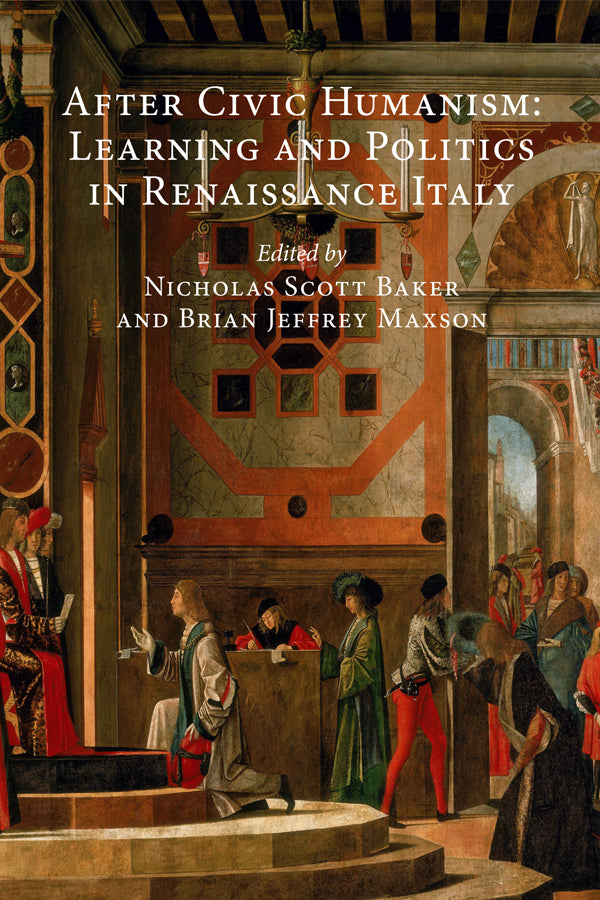After Civic Humanism: Learning and Politics in Renaissance Italy
Edited by Nicholas Scott Baker and Brian Jeffrey Maxson - ES35
Overview
The thirteen essays in this volume demonstrate the multiplicity of connections between learning and politics in Renaissance Italy. Some engage explicitly with Hans Baron’s “civic humanism” thesis illustrating its continuing viability, but also stretching its application to prove the limitations of its original expression. Others move beyond Baron’s thesis to examine the actual practice of various individuals and groups engaged in both political and learned activities in a variety of diverse settings. The collective impression of all the contributions is that of a complex, ever-shifting mosaic of learned enterprises in which the well-examined civic paradigm emerges as just one of several modes that explain the interaction between learning and politics in Italy between 1300 and 1650. The model that emerges rejects any single category of explanation in favour of one that emphasizes variety and multiplicity. It suggests that learning was indispensable to all politics in Renaissance Italy and that, in fact, at its heart the Renaissance was a political event as much as a cultural movement.
Edited by Nicholas Scott Baker and Brian Jeffrey Maxson.
Nicholas Scott Baker teaches early modern European history at Macquarie University in Sydney, Australia. He is the author of The Fruit of Liberty: Political Culture in the Florentine Renaissance, 1480-1550 (Harvard UP, 2013).
Brian Jeffrey Maxson teaches history at East Tennessee State University, where he is also Assistant Dean of Graduate Studies. He is the author of The Humanist World of Renaissance Florence (Cambridge UP, 2014).
297 pp.
ISBN: 978-0-7727-2177-8 softcover
Published: 2015
Contents
Nicholas Scott Baker and Brian Jeffrey Maxson, Introduction, “After Civic Humanism,”
- Oren J. Margolis, “After Baron, Back to Burckhardt?”
- Christopher S. Celenza, “Why Florence? Pocock, Civic Humanism, and the Debate Over the Latin Language”
- “Albertino Mussato and the Defence of Empire,” Alexander Lee
- Lorenza Tromboni, “Looking for Peace in Fourteenth-Century Florence: The “Difenditore della pacie” in Context”
- Brian Jeffrey Maxson, “Humanism and the Ritual of Command in Fifteenth-Century Florence”
- Elizabeth McCahill, “Civility and Secularism in the Ambit of the Papal Court”
- Gary Ianziti, “Pier Candido Decembrio and the Beginnings of Humanist Historiography in Visconti Milan”
- Jennifer A. Cavalli, “The Learned Consort: Learning, Piety, and Female Political Authority in the Northern Courts”
- Isabella Lazzarini, “A ‘New’ Narrative: Historical Writing, Chancellors, and Public Records in Renaissance Italy (Milan, Ferrara, Mantua ca. 1450-1520)”
- John Gagné, “Crisis Redux: The Views from Milan, 1499”
- Mark Jurdjevic, “Writing History in a Ruined World: Machiavelli, Guicciardini, and Vettori on History and Republicanism”
- Nicholas Scott Baker, “The Remembrance of Politics Past: Memory and Melancholia in Jacopo Nardi’s Istorie della città di Firenze”
-
Edward Muir, “The Perilous Legacy of Civic Humanism in Seventeenth-Century Venice”
Praise
“In moving past the constraints imposed by the so-called Baron thesis, the essays in this volume allow for an innovative focus on Renaissance humanism as a set of ‘practices’ determined more by social structures and networks than by specific historical events. In so doing, a number of these studies open up new areas of scholarly exploration.” — Scott Blanchard, Misericordia University
“The essays collected in this volume are remarkable for both the variety of their approaches and the depth of their analysis. Spanning no less than five centuries of Italian history and evaluating their interpretation by some of the most influential modern scholars, they once again prove the Renaissance to be a crucial time period when discussing such issues as the role of the humanities in shaping a state’s identity and providing paradigms of civic behaviour.” — Stefano Baldassarri, International Studies Institute, Florence
Reviews
Comitatus, 47. Princeton University (2016), pp. 242-245. Reviewed by Javier Patino Loira.
Renaissance and Reformation, 39.2 (Spring 2016), pp. 177-180. Reviewed by Ronald G. Witt.
Renaissance Quarterly, 69:3 (2016), pp. 1037-1039. Reviewed by Anthony Molho.
Seventeenth Century News, 73:3&4. (Fall 2015), pp. 203-205. Reviewed by Craig Kallendorf.
The English Historical Review 133:563 (Summer 2018), pp. 932-933. Reviewed by Robert Black.
Couldn't load pickup availability


